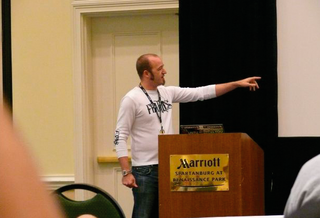
By Amber Graner
The 2nd Annual SouthEast LinuxFest (SELF) [1] was held in Spartanburg, South Carolina, June 11-13, 2010. The weekend combined southern hospitality with "Linux in the GNU/South," making this a great opportunity for many FOSS companies, enthusiasts, and advocates to introduce applications, operating systems, and philosophies to the Carolinas and beyond.
A half-day UbuCon (Ubuntu Conference) kicked off SELF 2010 with a speaker lineup that included Jono Bacon (Figure 1), Ubuntu Community Manager; Rick Spencer, Ubuntu Engineering Director; Pete Graner, Canonical Kernel Team Manager; and Jeremy Foshee, Canonical Kernel Team Bug Triager. The event was well attended and full of lively discussion.
Friday mostly consisted of vendors setting up and speakers arriving. Friday night included a speaker dinner and a pre-party for all attendees and speakers. Both the speaker dinner and the pre-party were well attended. Many attendees hung out in the hotel bar area rather than the pre-party because the bar offered a more relaxing setting.
The main SELF 2010 event kicked off with Dave Yates, President of the SELF Board, welcoming everyone. Jono Bacon's Saturday morning keynote, "New Era of Opportunistic Development on Ubuntu," began with some lighthearted humor directed at Jono. It was an 8:00am keynote, so the room was not filled to capacity, and many people missed the beginning. However, by the end of the keynote, more people were filing into the room and hallways.
As with SELF 2009, the speaker lineup [2] was a fantastic list of who's who in FOSS. With two days of sessions and more than 50 speakers, it was overwhelming at times to decide whose talk to attend.
Jon "maddog" Hall gave a well-received and well-attended talk on "A Personal History of Free Software." All of the attendees who commented on this session enjoyed hearing about the ever-evolving history of Free Software as seen and experienced by maddog. This was especially true for those who were new to Free Software and Linux. It was great to see a Linux professional who has been working with technology for the past 40 years relate to experienced as well as novice FOSS users and developers and make each feel included and welcomed to Free Software.
Pete Graner and David Mandala of Canonical talked about Ubuntu on ARM, which was one of the hottest topics at the Ubuntu Developer Summit in Brussels earlier this year. Pete and David answered questions about the new Linaro venture as well.
One of the talks that created some buzz at SELF and beyond was Ryan "icculus" Gordon's "Anatomy of a Failure." Gordon talked openly about his experience trying to get code accepted into the Linux kernel. Gordon also gave examples of others whose experience was similar and noted that some of those people had even left the Linux community. Gordon's takeaway point seemed to be aimed at developers and was that they should be cautious when entering the open source community. He made the point that although open source as a whole is fine, some areas resist change, and, at times, gang mentality rules.
Rikki Kite of Linux Pro Magazine and Ubuntu User gave a session on "10 Tips for Getting Published." Rikki is one of those speakers who adds humor and wit to a very clear and concise presentation. Rikki's talk was also one that SELF participants commended because many attendees were developers and advocates of open source initiatives who were looking for that "how-to" guide to getting published. Those who attended the talk walked away with encouragement and an "I can do this" attitude.
Cat Allman of Google talked about "Getting Started in Free and Open Source." Getting started can be as simple as advocating and using FOSS or as complex as developing applications and migrating a business to FOSS. Cat's talk, however, focused on beginners who want to get involved but don't really know where or how to start. Cat discussed topics such as why you might want to get involved, what you can get out of participating, how to chose a project, and more.
Max Spevack of Red Hat closed the Saturday talks with his keynote on "Community Catalysts." Max chose not to use slides and instead talked to a packed room on the merits of community and how the community that surrounds Red Hat and the Fedora project is a catalyst that drives many aspects of those projects and other greater open source indicatives.
If you missed SELF 2010, you missed more than the sweet tea, barbeque, and hospitality - you missed an event that educated, encouraged, and excited all the various degrees of interest and experience in open source and Linux through its speakers, vendors, participants, and planners and stood up to its boast of "Linux in the GNU/South."
| INFO |
|
[1] SouthEast LinuxFest: http://www.southeastlinuxfest.org/
[2] SELF 2010 speaker lineup: http://www.southeastlinuxfest.org/SELFapp/speakers.html |